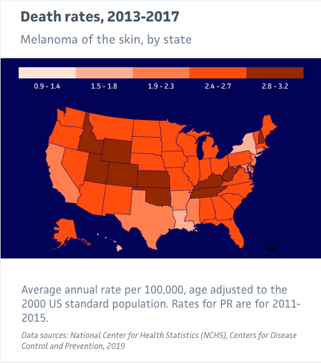If you live in or have visited Colorado, you most likely noticed that the state loves its outdoors. With 300 days of sunshine a year, many enjoy hiking, playing at a park or grabbing a craft brew on a patio. But with that love of sunshine comes an increased risk for skin cancer.
"Denver is the Mile High City, and studies suggest that living at elevation, where there is less atmospheric protection from UV rays can contribute to the development of melanoma,” says Camille Stewart, MD, assistant professor in the Division of Surgical Oncology and University of Colorado Cancer Center member. “It is a bigger problem for us in Denver and in Colorado than in other places.”
Melanoma is the most serious form of skin cancer but is less common than basal cell carcinoma or squamous cell carcinoma, which together are known as non-melanoma skin cancers. According to the American Cancer Society, it is estimated that there will be close to 2000 new cases of melanoma of the skin in Colorado this year, around .02% of the population. Luckily, being close to the sun and enjoying the outdoors does not make us the state with the highest percentage. That unwelcome title falls to the state just west of us, Utah, with .04% of people being diagnosed this year. However, Colorado belongs in the unwanted category of the 10 states with the highest rates of death for melanoma.
CU Department of Surgery Melanoma Program
With this data in mind, many partners in the CU School of Medicine are focusing efforts to reduce the risk of melanoma, catch it early and deliver effective treatments. One way they are doing this is with the recent hire of Camille Stewart, MD, director of the Melanoma Program within the Department of Surgery.
“My goals for the program are to increase our local, national and international presence and to actively contribute to the body of knowledge of how to best treat patients with melanoma,” stated Stewart.
In the past there were not many effective treatments for melanoma. This left surgery, sometimes radical surgery, as the primary treatment option.
“There have been major advances in research and treatment for melanoma, making this an exciting field to be in right now,” says Stewart.
Right now, there are more than 50 clinical trials around the treatment and detection of melanoma taking place at the Anschutz Medical Campus.
→ Melanoma Skin Cancer Clinical Trial Provides Hope When Options Looked Bleak
On top of providing patient-centered care in the clinic, Stewart wants to keep a component of her work in research helping learn more about new treatment options.
CU School of Medicine providers can offer more than clinical trials to patients -- they also have a melanoma multidisciplinary tumor board discussion weekly. This program provides melanoma patients with care options from multiple specialties including surgical oncology, medical oncology, dermatology, radiation oncology, radiology, and pathology.
Between the clinical trials and the tumor board, the Anschutz Medical Campus is the go-to place for Coloradans and residents of surrounding states to receive the latest, most up to date treatment care for malignant melanoma.
Treating cancer in the time of COVID-19
As Stewart starts her new role, it is hard not to recognize that we are currently in the coronavirus pandemic.
“We don’t want to minimize what is going on in the world or act like it is not important, but we are not going to stop the work being done in the cancer community or stop taking care of these patients that need us,” says Stewart.
Cancer patients still need to prioritize screenings and treatments to allow for early detection and to prevent cancer progression.
“I am confident that we are going to be able to make cancer treatment a priority in spite of being in the middle of a pandemic,” says Stewart. “It is difficult to envision that there is a priority that is bigger than COVID-19 right now, but I also do not want to minimize what is happening in the lives of people who have cancer. We do not want this pandemic to prevent them from getting the care that they need.”
Stewart has even investigated the use of personal protective equipment (PPE), which was published in the Annals of Surgery. Along with a team, she looked at what forms of PPE are appropriate and could reduce the spread of the coronavirus for surgical teams.
“I feel passionate that we are still able to deliver excellent care if we are cautious and thoughtful about the ways that we do it,” explains Stewart. “We have had to modify our workflow to ensure that patients are safe.”
Details about Camille Stewart, MDDr. Stewart will be seeing patients at:
- Anschutz Medical Campus.
- Highlands Ranch UCHealth Cancer Center.
- Cherry Creek UCHealth Cancer Care and Hematology.
Dr. Stewart was trained in general surgery at the University of Colorado, and in Complex General Surgical Oncology at City of Hope in Duarte, California. She is director of the Melanoma program, and also sees patients with sarcoma and gastrointestinal cancers.




